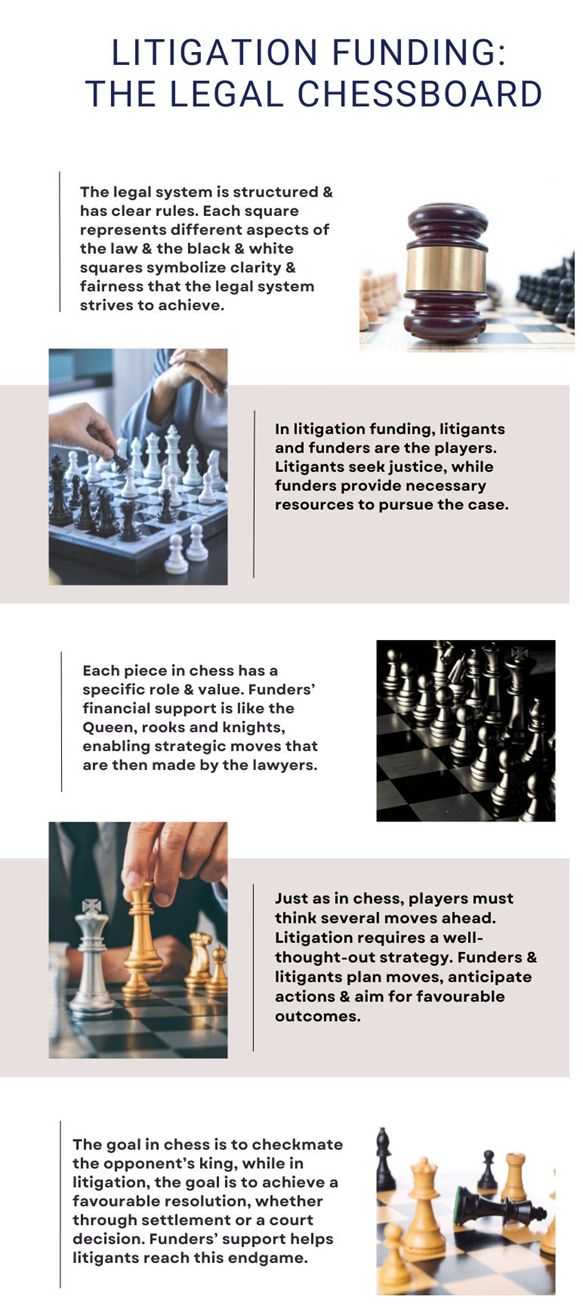Introduction
Litigation funding, also known as litigation financing, external dispute financing, or third-party funding ('TPF'), has emerged as a transformative tool in the legal landscape of many countries, including India. This mechanism involves a third party, with no prior connection to the litigation, financing part or all of the costs of the legal claim. In return, the funded litigant agrees to share a portion of any proceeds recovered from settlement or damages with the funder. Despite its growing prevalence, the legal framework governing TPF in India remains undeveloped. This article explores the TPF concept in India, its historical roots, current legal status, ethical considerations, and practical implications for both litigants and funders.
Defining Litigation Funding
The Task Force of the International Council for Commercial Arbitration and Queen Mary University of London has provided a comprehensive definition of TPF in its April 2018 report. It states that TPF refers to an agreement by an entity, not a party to the dispute to provide a party, an affiliate of that party, or a law firm representing that party with funds or other material support to finance part or all of the cost of the proceedings. This support is provided in exchange for remuneration or reimbursement that is wholly or partially dependent on the outcome of the dispute or through a grant or premium payment.
TPF typically involves non-recourse funding, meaning that if the claim invested in is not successful, the claimant does not need to repay the legal costs covered by the funder. This high-risk, high-reward arrangement places most of the risk on the funder, who bears the potential loss of the claim and any related damages.
Historical Context & Champerty
The concept of champerty, part of English common law, serves as a foundation for understanding TPF in India. Historically, English common law treated 'maintenance' and 'champerty' as torts and crimes. Champerty is a derivative of maintenance where the doctrine of maintenance prohibits strangers from continuing litigation without cause. Champerty essentially involves third parties funding litigation costs in exchange for a share in the proceeds from the dispute resolution. Indian courts have held that the strict English law rules of champerty and maintenance do not apply in India. Contracts for funding litigation are legally unobjectionable between third parties, provided no lawyer is involved. This judicial stance, examined next in the article, has paved the way for the acceptance and growth of litigation funding in India.
Legal Framework & Judicial Recognition
India's position on TPF is favourable to funders, although concrete legal frameworks are yet to be established. While TPF is not governed or regulated by any specific law in India, it has been equated with contingent fee arrangements, which are expressly prohibited in India under r. 201 of the Rules on Standards of Professional under s. II of ch. II, part VI of the Bar Council of India Rules. However, these arrangements are common in countries like the USA, Canada, and South Korea. In fact, in the USA, lawyers who engage in such fee arrangements are labelled as 'ambulance chasers,' connoting that they pursue victims of accidents to represent them on a contingent fee basis.
The Supreme Court of India, in BCI v. AK Balaji2, indicated no prohibition on TPF as long as lawyers are not involved. Observations made in this judgment and similar ones in the case of "G" Senior Advocate, In re3, suggest that TPF is not against public policy, provided it does not involve legal practitioners. However, the observations in both these judgments were in the nature of obiter dictum and not ratio decidendi, meaning that they were mere opinions of the court and did not have any binding authority or force as such. In this context, "G" Senior Advocate (supra) is a controversial case to cite as an advocate since this was a case where the Supreme Court was considering disciplinary action against an officer of the court having entered into a fee arrangement with his client, which was held to be not against public policy had it been entered into by anyone other than a lawyer. Besides this observation, the matter was disposed of by suspending the advocate, not only for entering into such a contract but also for making personal attacks on the Chief Justice in his petition, which constrained the court from dealing with him lightly.
Further, s. 23 of the Indian Contract Act, 1872 addresses unlawful and void agreements if they oppose public policy. According to this provision, an agreement is deemed unlawful if it, inter alia, is considered immoral by the court or is opposed to public policy. Now, what is the meaning of 'opposed to public policy'? Basically, if an agreement violates established societal interests or moral norms, it is deemed against public policy and becomes void. If such an agreement is declared invalid, a person cannot challenge it based on the freedom to enter into a contract.
One of the landmark judgments in this regard is Ram Coomar Coondoo v. Chunder Canto Mookerjee4, where the Privy Council considered a TPF transaction and addressed the need to be cautious of gambling in litigation. While holding that TPFs are not opposed to public policy, such arrangements must be entered into with extreme caution and care to be on the correct side of the moral compass, not encouraging unrighteous suits but assisting and furthering rights and justice. It was held that such an agreement created no legal privity between the opposite party and the funder from which a promise can be implied on the part of the opposite party to pay to the funder his costs of the former action, on which an action of contract can be founded; nor does it establish a legal wrong, for the former action was brought without improper motives, and upon reasonable cause. Hence, an action cannot be maintained against a third person on the ground that he was a mover of and had an interest in a suit in the absence of malice and want of probable cause.
Ethical Considerations & Busting Myths
The concept of TPF may raise ethical questions. Whenever ethics are involved, it becomes a dangerous game as it immediately attracts a lot of judgment and preoccupied minds or is approached with prejudice. However, the ethical considerations can be addressed with transparency and informed consent. It has to be understood that contrary to what is often thought to be immoral or unethical, the funders do not influence or exercise any control over the actual litigation in the matter. They push the matter only by funding it. Based on this understanding, it may be incorrect to equate funding that enables a party to pursue a cause of action fully and effectively by transferring the right to sue.
Further, it is crucial to dispel the myth that TPF is only done for those litigants or cases that cannot afford proper legal representation. This may be true in some cases, but this is a myth. On a global level, big players, funders, and investors fund various commercial, corporate, recovery, and bankruptcy categories of cases, even in the case of litigants who can afford the litigation. The litigant may want to distribute or hedge the risk by availing TPF and share the proceeds arising from the litigation.
Some critics argue that regardless of how a TPF transaction is structured, it constitutes speculative litigation whereby a third party is given the right to sue and take control of the litigation, drawing a reference to s. 6(e) of the Transfer of Property Act, 1882, states that a mere right to sue cannot be transferred.5 This seems to be an incomplete viewpoint as it does not take into account the legitimate and sometimes honourable operations of entities engaged in TPF on a global level who only require a proper brief of the matter and the realistic outcome possibilities in the matter by a reliable firm or advocate to determine whether to fund the matter or not. Thus, such reasoned decision-making cannot be considered speculative.
Such funding opens another viewpoint that the lawyer, by letting the client know that litigation funding is an option, helps the client if there is a genuine cause of action but no money to pursue it. If the client then chooses to take such funding by sharing some percentage or pre-determined benefit depending on the outcome of the matter, the lawyer only provides a detailed overview of the matter to the funder to enable it to determine whether to fund or not. Such an arrangement does not automatically translate to having any control or power over the matter in any manner whatsoever – the client still retains the cause title of the case. The lawyer represents and argues the matter as he would have if the client had been paying the entire fee, and decisions are made with consultation between the lawyer and the client. The funder is only the fuel to the car, not determining the speed of the car or the direction in which it is being driven.
Another problem that such arrangements solve is immediate liquidity requirements, which are inevitable and sometimes sudden in litigation. This becomes more necessary given the pendency of cases in India that constrain the courts and burden the judiciary, resulting in slow-moving cases. Hence, the view is very different when looked at from a business perspective, where a client gives a percentage of, say, the damages recovered or the settlement amount to the funder in exchange for his funding to carry the matter through to the end.
Another concern that may cloud minds is attorney-client privilege in litigation funding. This is another myth that needs busting, wherein the attorney-client privilege is maintained as the lawyer is required to only inform the third party about the particulars of the case to the extent for it to determine the risks involved in such funding. Hence, the confidential communications and discussions between the lawyer and the client remain confidential without any interference from the funder. Even this much information divulged to the funder by the lawyer is with the consent and waiver of the client, as the case may be.
Practical Implications for Lawyers, Clients & Funders
In this background, it is now simpler to wrap our heads around the concept of litigation funding in India. For lawyers starting to engage with litigation funders, maintaining independence is crucial. Due to the funder's involvement, they must uphold their professional judgment without compromising the client's interests. Full disclosure is also essential; when advising clients on funding arrangements, lawyers and funders (once the client agrees) should provide complete transparency about the interests at stake, risks, benefits, and structure of the funding. Full disclosure ensures informed consent and transparency in the process. Additionally, lawyers should be cautious not to predict the potential outcome of a case. The Supreme Court in Bhavna Lall6 expressed disappointment with a lawyer who allegedly prejudged the outcome of a matter, advising the client that their appeal would not succeed. In its prima facie opinion, the Court suggested that such speculation and prejudgment were too close to the border of professional misconduct.
For funders, a comprehensive checklist when evaluating a funding request would include assessing the merits of the claim, the credentials of the claimant, the litigation budget, the claimant's legal representation, expected damages, procedures and timelines prescribed under the applicable statute, case type, the action's significance, complexity of issues involved, and preparation of diligence papers. These inputs and outputs provide an edge to the matter, offering probability statistics and strategic calculations often missing from traditional approaches to litigation.
Tracing the enactments in India's legal system reveals how it has modernised itself, with a focus on areas relevant to litigation funding – starting with the Companies Act, 2013, which governs the framework for company formation, management, and operations, including corporate governance, cross-border corporate structuring, financial reporting, and shareholder rights, to the Commercial Court Act, 2015, which aims to expedite commercial dispute resolution for cases with a minimum claim value of Rs. 1 crore. The Insolvency and Bankruptcy Code, 2016 ('IBC') is another space for TPF that could play a crucial role in enabling insolvent companies to pursue resolution processes that may otherwise be financially unfeasible. It may also assist the resolution professionals (RPs) and the committee of creditors (CoC) to maximise recoveries. These Acts have substantially opened doors for litigation funding in India's corporate, commercial, and insolvency matters.
Further, the IBC (Amendment) Act, 2021 introduced the pre-packaged insolvency resolution process (PPIRP) for MSMEs, which will be completed within 90 days. This tight timeline necessitates swift decisions on avoidance proceedings, which could benefit from litigation funding, assuring a result for the funder within the prescribed timeline, favourable or not. MSMEs often face significant dues from larger corporations and experience poor recoveries from corporate insolvency resolution processes (CIRP), leading to litigation and delays. Litigation funding has the potential to assist MSMEs in recovering their dues.
Conclusion
In 2019, Hindustan Construction Co. Ltd. ('HCC') pioneered7 the first TPF transaction in India's infrastructure sector through a partnership with a consortium led by BlackRock Inc. This landmark deal involved HCC monetising its arbitration awards, primarily from disputes with public sector entities, by transferring its claims, valued at Rs. 2000 crores, into a special purpose vehicle (SPV) managed by the investors in exchange for an upfront payment of Rs. 1750 crores. This development indicated a growing acceptance of litigation funding in India, offering much-needed financial relief to the cash-strapped infrastructure sector. The sector is heavily burdened with arbitration claims, and the recent trend of Indian courts upholding arbitral awards without interference has further encouraged confidence among overseas investors, potentially paving the way for more litigation funding deals in this sector.
Such examples demonstrate the gaps litigation funding can fill in India, with significant potential to transform the Indian legal landscape. While ethical and legal challenges primarily arise from traditional perspectives, transparency and informed consent can significantly address these concerns. From the correct perspective, TPF is a strategic and well-planned process rather than a gamble. It is not speculative in nature but rather akin to chess—a game of skill and strategy, where TPF is a calculated investment based on thorough legal analysis and risk assessment.

Footnotes
1. S. II: Duty to the Client: 20. An advocate shall not stipulate a fee contingent on the results of litigation or agree to share the proceeds thereof.
2. (2018) 5 SCC 379.
3. 1954 SCC OnLine SC 198.
4. 1876 SCC OnLine PC 19.
5. Third-Party Funding of Litigation – A Damocles Sword or a Welcome Step, 2021 SCC OnLine Blog OpEd 62.
6. Madhavendra L. Bhatnagar v. Bhavna Lall, (2021) 2 SCC 775.
7. Singh, G. (2019) 'Litigation Funding Comes to the Rescue of Infrastructure Sector', Times of India. Reader's Blog, Business, 09.04.2019.
The content of this article is intended to provide a general guide to the subject matter. Specialist advice should be sought about your specific circumstances.


